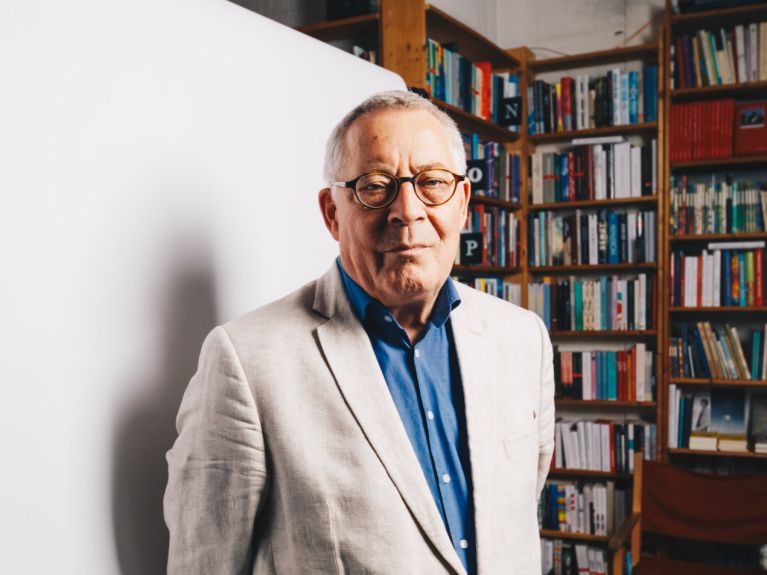Educated view of Russia and Ukraine
The expert in Eastern European history Karl Schlögel is the winner of the 2025 Peace Prize and a dedicated opponent of historical misrepresentation.

You might meet him at a protest march: Karl Schlögel is not the type of historian who tends to hide in his study. He is a historian who is willing to campaign for the things he cares about and to get involved in society. The 77-year-old expert in Eastern European history who lives in Berlin could be seen at numerous anti-war protests in recent years, wearing a Ukrainian flag wrapped around his shoulders.
Karl Schlögel who is married to the publicist Sonja Margolina, who is originally from Moscow, was selected as the winner of the 2025 Peace Prize of the German Book Trade. He will receive the award that is worth 25,000 euros and is traditionally presented during the Frankfurt Book Fair on 19 October. The ceremony will be held in the Paulskirche, a key site of German democracy history.
“As a scholar and stroller, a modern-day archaeologist, a seismograph of societal change he explored cities and landscapes in central and Eastern Europe even before the fall of the iron curtain,” the jury wrote in its statement. The historian is honoured for his extraordinary body of works, for his passion for making Eastern European environments accessible not only academically but also to a wider public through his travels and exchange with locals and his texts.
Early trips to the Soviet Union
Karl Schlögel was born into a farming family in the Allgaeu region on 7 March 1948 and came in touch with post-war refugees on his parents’ farm from a young age. During his time as a pupil at a Benedictine boarding school he learned Russian from a teacher who had fled from Eastern Poland to the American occupation zone. He first visited the Soviet Union in 1966 on a school trip that went from Budapest via Lviv, Kyiv and Kharkiv all the way to Moscow. Two years later, as a young man, Schlögel witnessed the Prague Spring in the capital city of Czechoslovakia. The attempt to establish “Socialism with a human face” in Czechoslovakia was brutally crushed by the Warsaw Pact troops.
Karl Schlögel studied Eastern European history, philosophy, sociology and Slavic studies at the Free University of Berlin and was an active member of the Maoist organisation KPD for a while. He wrote his doctoral thesis about labour disputes in the Soviet Union. He then worked as a freelance translator, publicist and author, until he was appointed to the newly created chair for Eastern European history at the University of Konstanz in 1990. Five years later, he moved on to the European University Viadrina in Frankfurt (Oder) where he taught and conducted research until his retirement in 2013. In his work, he focussed on Eastern European cultural history, the history of Russian emigration and urban culture in Central and Eastern Europe, always incorporating present-day perspectives.
Evolving perception of Russia
Schlögel likes to see things from unfamiliar yet enlightening points of view. In his book “The Scent of Empires: Chanel No. 5 and Red Moscow” (2020), for example, he tells the story of Europe based on the two well-known perfumes. Schlögel’s new book “Auf der Sandbank der Zeit” (On the Sandbank of Time), in which he speaks about the ways in which his own perception of Russia has been evolving in the context of the war in Ukraine, was published in October 2025.
I hardly dare saying this: it took a war to bring Ukraine to our mental map
In a speech he delivered on the occasion of receiving the Gerda Henkel Prize in autumn 2024, Karl Schlögel stressed how shocked he had been by the annexation of Crimea and the start of Russia’s war in the Donbass region in 2014: “It is about understanding that you have to start over. In this case this meant to finally appreciate and acknowledge that there was a country, a state, a nation called Ukraine that had only ever been perceived from a Russo-centric perspective that was focussed entirely on the capital of the former Soviet Union and from which Ukraine was merely the hinterland, a transit country, the periphery, a provincial place without its own history, culture and language. I hardly dare saying this: it took a war to bring Ukraine to our mental map, and to move it from the offside to the centre of attention.” Schlögel travelled across Ukraine and his experiences led to a collection of portraits of Ukrainian cities (“Ukraine. A Nation on the Borderland” 2015).
He was shocked for a second time when Russia invaded the whole of Ukraine in February 2022. Karl Schlögel decided “to go back to being a student and to take a look around on site,” he admitted self-critically.
Commitment for Ukraine and the Russian civilian population
The historian demonstrates his solidarity with all those in Eastern and Central Europe who risk their health and their lives to take a stand for freedom and human rights. His commitment is directed at both Ukraine and the Russian civilian population.
The anthology “Memorial. Erinnern ist Widerstand” (Memorial. Remembering is Resistance) that was published in May 2025 by members of the human rights organisation that was founded in Moscow, also includes a text by the expert in Eastern European history. In a laudatory speech about Memorial, Schlögel once said that advocates of historical truth had to deal “with the guards outside the archives, the censors that don’t want to burden themselves with the whole truth, with defamers and the hatred of those who think of a truthful depiction of reality as dangerous and threatening”. Karl Schlögel speaks up against those who falsify reality and he stands up to fight for truth.